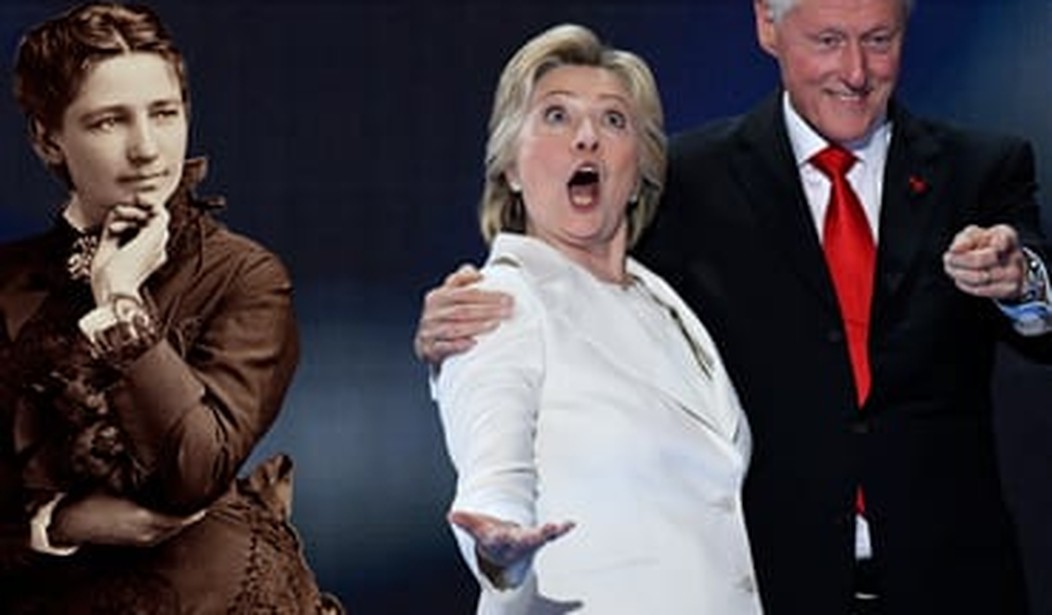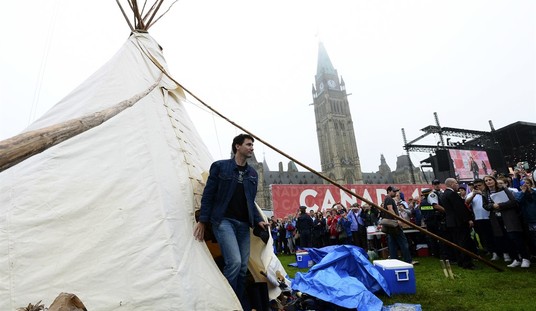We are now being drenched by a torrent of media adulation for Hillary Clinton, extolling her as the first female candidate for the presidency in American history. Many of the news items focus exclusively on Hillary’s gender priority, and ordinary folk I have spoken to about the issue are convinced that she has no female predecessor, believing she is the first woman in American history to figure on the presidential stage. Writing in the New York Times, Nicholas Kristof gushes in one of the most fatuous articles I have ever read even by NYT standards (though Leonard Shlain’s lunatic argument that the invention of fire and literacy have led to the diminishment of “female values [and] female power” is a worthy competitor), that “whatever one thinks of Clinton, her nomination is a milestone, and a lesson of history is that when women advance, humanity advances.” Of course, there is no verifiable evidence for so vast an abstraction and, as Janet Bloomfield (among others) has clearly shown in a methodical analysis of the hypothesis, some reason for skepticism.
But the real issue that should concern us is that gender is a red herring, having nothing to do with character, vision or political capacity and thus completely irrelevant in the context of fitness for the office of president. No matter. Muliebrity has become a pre-eminent factor in the current electoral sweepstakes and may go some way to installing Hillary in the White House. Moreover, the media emphasis on the Hillary Monologues, apart from the fact that it is both trivial and beside the presidential point, is also to some extent misleading. True, much of the hoopla surrounding Clinton is that she is the first woman representing a major political party; nonetheless, she is by no means the first female to head a national ticket, that honor going to Victoria C. Woodhull in 1872 as a candidate for the Equal Rights Party.
Woodhull, the founder of the first female-led (and successful) brokerage firm on Wall Street and co-founder of a newspaper, was a smart and determined woman with an engaging if utopian platform—in some ways not that different from today’s Democratic objectives. “Woman’s strength and woman’s will,” she wrote in her political manifesto, would open “a new career of greatness in the race of nations.” She also supported free love, welfare for the poor, the nationalization of the railways, an eight-hour workday and the abolition of the death penalty. Woodhull’s pursuit of high office was cut short by a prison sentence for libel after publishing an article critical of well-known preacher Henry Ward Beecher. (Some hope history will repeat itself.) “It was a meteoric and, some would argue, reckless assent that ended in disaster,” writes Mary Gabriel in her Notorious Victoria: The Life of Victoria C. Woodhull, Uncensored.
There have been several other women nominated by splinter parties with no chance of being elected, but who strutted their stuff for a time—Belva Lockwood, Charlene Mitchell, Linda Jennings, Margaret Wright, Ellen McCormack, Sonia Johnson, Lenora Fulani, Cynthia McKinney and Jill Stein. How serious or plausible their aspirations were is another question, but they certainly entertained presidential ambitions. (Some might argue that the U.S. already has a female president—in de facto mode, to be sure—namely, Valerie Jarrett, who appears to control Obama’s decision-making process.) Nor should we forget Geraldine Ferraro, the first female vice-presidential candidate representing a major political party, chosen by Walter Mondale in 1984, as well as John McCain’s running mate, the much-abused Sarah Palin, whose gender counted for nothing with her progressivist detractors.
The fact is that even 150 years ago women were critically engaged in the political process; Hillary’s presumed uniqueness as a woman is in no way amazing or unprecedented. The most that can be said in this regard is that she is the culmination of a long line of female precursors, but she is by no means a singularity and plainly does not merit the mantle of unparagoned novelty which the media have bestowed on her. The general impression the pro-Hillary army of pundits, anchors and political partisans have planted in the minds of an uninformed public, that Hillary’s gender renders her exceptional, is a canard of the first magnitude. Hillary is obviously exceptional in other ways, namely, she is probably among the most corrupt, disingenuous, venomous, bad tempered, generally disgraceful and dramatically incompetent presidential hopefuls ever to have sullied an electoral campaign—and there have been many. (Admittedly, the suavely androgynous Obama can give her a run for her money, though I suspect she might nose him out in a photo finish.)
Despite what a sectarian press is trying to drum into us, Hillary’s gender is patently not precedent setting. There have been many far more accomplished and, indeed, morally superior women in the higher regions of American politics before her. Whatever her prestige ranking may be—and, as we’ve seen, it is to a considerable degree moot—the bottom line is that Hillary’s sex is, or should be, a non-starter in the debate about her intellectual ability or policy-making aptitude. It is much ado about nothing. For gender is neither an achievement nor a qualification.









Join the conversation as a VIP Member